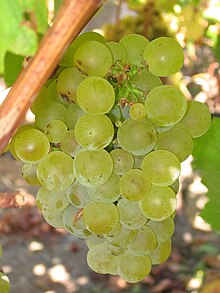Sauvignon Blanc
| Sauvignon blanc | |
|---|---|
| Grape (Vitis) | |

Ripe Sauvignon blanc grapes
|
|
| Color of berry skin | Blanc |
| Species | Vitis vinifera |
| Also called | Sauvignon jaune, Blanc Fume (France), Muskat-Silvaner (Germany & Austria), Fume blanc, seventy on blocks and other synonyms |
| Origin | France |
| Notable regions | South Africa, Chile, New Zealand, California, Loire Valley, Bordeaux |
| Notable wines | Sauternes, Sancerre |
| Hazards | Powdery mildew, oidium, black rot, and Botrytis cinerea |
Sauvignon blanc is a green-skinned grape variety that originates from the Bordeaux region of France. The grape most likely gets its name from the French words sauvage ("wild") and blanc ("white") due to its early origins as an indigenous grape in South West France. It is possibly a descendant of Savagnin. Sauvignon blanc is planted in many of the world's wine regions, producing a crisp, dry, and refreshing white varietal wine. The grape is also a component of the famous dessert wines from Sauternes and Barsac. Sauvignon blanc is widely cultivated in France, Chile, Canada, Australia, New Zealand, South Africa, Washington and California. Some New World Sauvignon blancs, particularly from California, may also be called "Fume Blanc".
Depending on the climate, the flavor can range from aggressively grassy to sweetly tropical. In cooler climates, the grape has a tendency to produce wines with noticeable acidity and "green flavors" of grass, green bell peppers and nettles with some tropical fruit (such as passion fruit) and floral (such as elderflower) notes. In warmer climates, it can develop more tropical fruit notes but risk losing a lot of aromatics from over-ripeness, leaving only slight grapefruit and tree fruit (such as peach) notes.
...
Wikipedia
